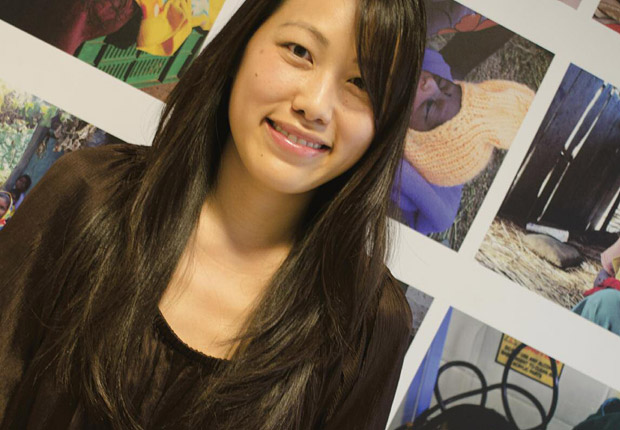
At the product launch this spring for Embrace, an innovative infant warmer designed to save the lives of vulnerable babies, snafus kept popping up. The electricity went out at the startup’s packaging and quality control facility in Bangalore, India. The wash-tags were printed incorrectly and had to be redone and stitched in. And when Jane Chen ’00 and her team set off to mail the very first shipment, their rented car sprang a flat, forcing the group to hail a rickshaw.
Chen, Embrace’s CEO, overcame the problems with the same determination and creativity that led her to co-found Embrace. “Everything that could go wrong did, but we were determined no matter what to deliver the product,” Chen says by phone from Bangalore. “People napped for an hour on the couch in the office, but otherwise worked through the night.”
Each year, more than 20 million premature and low-birthweight babies are born worldwide. Four million die in the first month of life because their internal organs are underdeveloped and the babies don’t have enough fat to regulate their body temperature. Survivors may grow up with severe health problems such as diabetes and heart disease–which could be prevented if they were kept warm.
However, in villages in developing nations, babies are often born at home or in rural clinics that lack incubators or use ineffective, stopgap measures such as tying on hot water bottles or keeping the frail patients under light bulbs. In the cities, hospitals may not have enough incubators, or find them confusing to use and difficult to maintain and repair.
At $200, the Embrace infant warmer is a fraction of the $20,000 cost of a traditional incubator. Resembling a tiny sleeping bag, the device uses a pouch of a wax-like substance that can be heated to keep the babies warm for four to six hours at normal human body temperature. They’re portable, safe, and easy to use and re-use.
The ingenious product has attracted widespread attention for Chen, who has been featured in The Wall Street Journal, The Economist and a segment on ABC News. She was selected as a fellow at TEDIndia–the influential conference of global movers and shakers–and as the recipient of Pomona’s Inspirational Young Alumni Award for 2011.
At Pomona, Chen, a psychology major, mentored at-risk high school students and spent a semester abroad in Nanjing, which kindled her interest in working internationally. After graduation, she headed to Hong Kong as a management consultant. After reading about villages hard hit by AIDS in China, she became a program director at a startup non-profit that funded and operated projects in education and care for children and adults impacted by AIDS, raising funds and increasing public awareness about their plight.
“I realized how lucky I was, to be born in the point one percent of the luckiest people born on the planet. I could have been born into another life,” says Chen, the daughter of Chinese immigrants. “It exposed me to the injustices of the world.”
She returned to earn an M.B.A. and a master’s in public policy in a joint program at the Stanford Graduate School of Business and the John F. Kennedy School of Government at Harvard. Embrace emerged from a 2007 class project at Stanford, where Chen, along with Linus Liang, Nag Murty and Rahul Panicker–classmates from diverse backgrounds in engineering, business, public policy, entrepreneurship and computer science–created the prototype after a trip to Kathmandu, Nepal, where they witnessed the immense need firsthand.
The road from idea to market has been arduous, taking Chen across 11 states in India, interviewing doctors, midwives and government health officials to refine the device. “We wanted to make it truly locally appropriate, rather than something we came up with in the U.S. and force-fed on the other end,” she says. Leading up to April’s launch, there were animal trials with preemie lambs in Utah, presentations of research at medical conferences, business meetings in India and distribution deals with companies such as GE Healthcare and Novartis and NGOs such as Population Services International.
Initially, Embrace is selling a version that requires 20 minutes of electricity to heat up the device, for clinics and hospitals with intermittent power. The second version, to launch in October, is geared towards home use and relies on hot water as the heat source.
“It’s a huge market, but it’s going to take convincing that community health workers should be equipped with this tool, just like a stethoscope,” says Kevin Starr, director of the Rainer Arnhold Fellows Program, which mentors social entrepreneurs, and funds Embrace through its parent organization, the Mulago Foundation. The startup, in the process of securing venture capital funding, will have non-profit and for profit arms. So far, Embrace has raised over $2 million through foundations and individual contributions.
The company will be based in Bangalore and Chen has settled into life in India with gusto and aplomb. Clad in the traditional garb of a shalwar kameez–flowing tunic over billowy pants–and climbing aboard rickshaws, she comes off as a native, says Vinod K. Bhutani, a neonatologist at Stanford University Medical Center who has worked extensively in India on health policy and education. “She blends in,” says Bhutani, also an Embrace board member. “She’s learning to communicate the body language and understand the nuances.”
After India, Embrace plans to expand its distribution into other countries throughout South Asia, China, Kenya and Uganda and eventually develop additional affordable medical technologies. “Every time we go to a clinic,” Chen says, “we see 12 other needs that could be addressed.”
